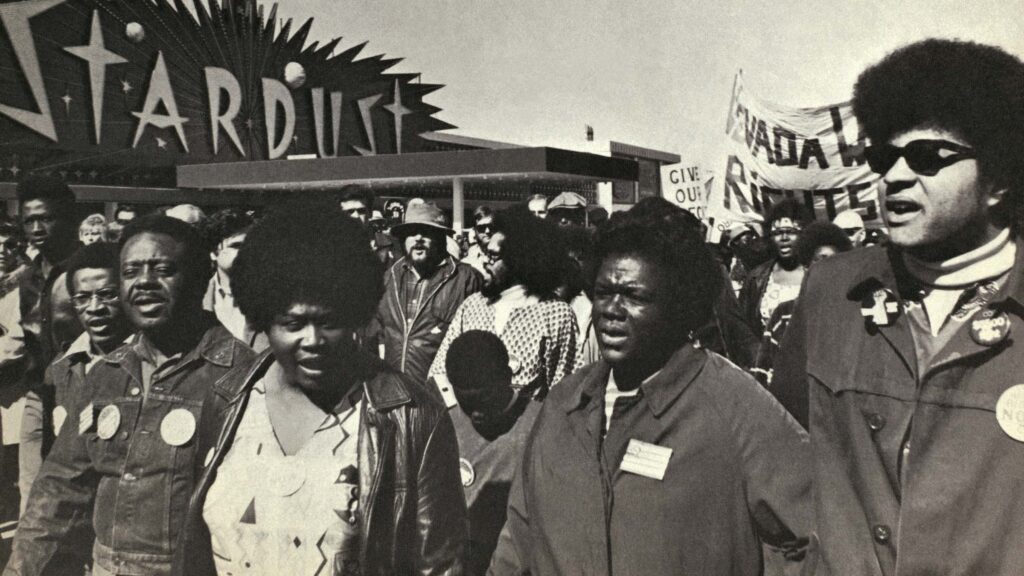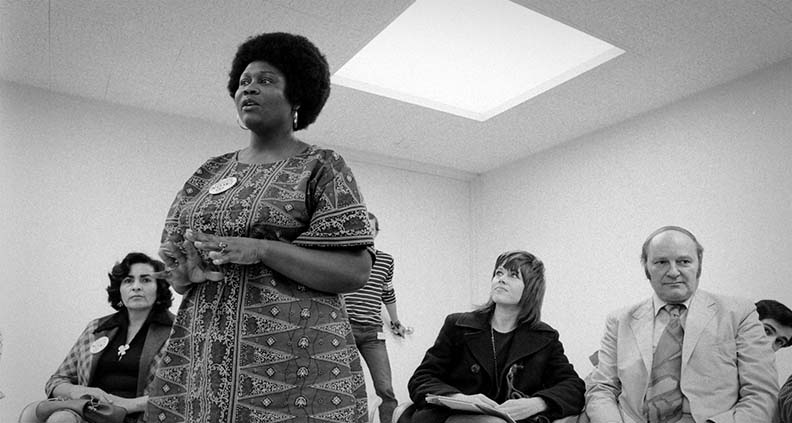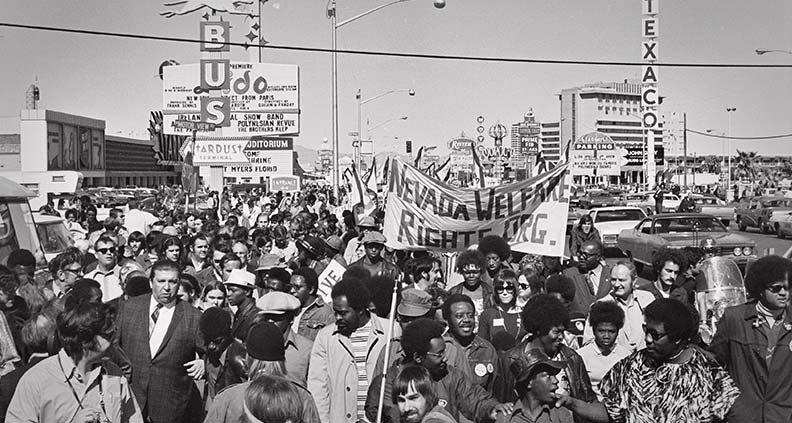
If not already apparent, the COVID-19 pandemic of recent years—and its subsequent global economic impact—has shone a spotlight on just how precarious most American lives actually are, whether publicly or behind closed doors.
It’s debatable whether anyone truly works a billion dollars hard or smart, yet wealth continues to amass in the hands of an obnoxious mega-rich elite, leaving most of us one bad day away from complete financial ruin. That is, if we don’t already exist in a chronic state of economic depression to begin with. But our democracy (and tax dollars!) provides guardrails against such dire domestic predicaments, right? Well, in theory…
In practice, however, the US welfare system is under constant threat from within—the kneecapping of government assistance programs becoming a reliable wedge issue for compounding generations of conservative politics.
Then again, there’s an equally influential history of civil rights advocates—frequently women of color—fighting to mend a broken system. Take the subject of filmmaker Hazel Gurland-Pooler’s new feature-length documentary Storming Caesars Palace, Ruby Duncan.
A key figure in the National Welfare Rights Organization (NWRO), Las Vegas single mother Duncan took her protests not just to the streets, but to the casino floors and restaurants of Sin City’s ritziest hotels. Gurland developed the project in part in Film Independent’s Documentary Story Lab—now accepting submissions for 2024.
We recently spoke to Gurland-Pooler about her personal attachment to the material and the urgency of capturing Ruby Duncan’s story before it was too late. Storming Caesar’s Palace premiered earlier this year as part of Independent Lens on PBS. Storming also recently won IDA’s ABC News Video Source Award for use of archival material at the recent IDA Awards.
HAZEL GURLAND-POOLER
Let’s start with the origin of Storming Caesars Palace. How did this project come into focus? What about the story were you were passionate about?
Gurland-Pooler: It’s funny, from the outside I’m not someone who has been on public assistance—although I’ve definitely been on unemployment from time to time, which is essentially the same thing…
Sounds like the life of a filmmaker.
Gurland-Pooler: Exactly. And I’m not from Las Vegas, so this is not my personal experience. I was born to a teenage mother in Bogota, Colombia—or at least that’s the story, I don’t actually know if it’s true—so I’ve always wanted to share and uplift stories of mothers who are working really, really hard to provide for their children. I came across Ruby Duncan’s story and the stories of many moms in the Welfare Rights Movement, who were fighting every step of the way to have enough money to feed and clothe their kids and give them shelter. Because my birth mother wasn’t able to do that for me, I’ve just always been inspired by women who have done that, despite all the things they’re struggling against.
Where did you first encounter Ruby’s story?
Gurland-Pooler: It was a book first by Annelise Orleck. I was listening to an interview with Annalise on NPR and was like, “This book sounds amazing, I have to go get it.” So I bought it and read it. “This should be a documentary,” I thought. I’d been working as an AP on a lot of different historical documentaries and thinking: Why are all the stories that I’m working on about old white men, directed and produced by old white men? It just hit a nerve. At the time I don’t think I put two-and-two together, that it felt so personal.

I think that happens a lot with nonfiction filmmakers. You spark to a subject for whatever reason and feel the itch to pursue it, not realizing until later what the actual subconscious attraction was.
Gurland-Pooler: I read the book in 2005 and introduced myself to Ruby Duncan, but the film took 15 years to make. I got married and had a kid in that time and was working full time jobs the entire time until I got the green light from PBS. A lot of the reason the movie took so long was because I didn’t really have proper funding, I was always using savings and going out to Vegas on holidays to try to shoot stuff. Once I got more support, things happened much faster. Not to put too fine a point on it but there was a sense of urgency, due to Ruby’s age, to make sure she was going to be able to tell her whole story and enjoy the film once it came out. She put a lot of faith and trust in me. So I always feel good knowing that everybody [in the Las Vegas welfare rights community] was happy with the way that it turned out.
What challenges did you encounter during the fundraising process?
Gurland-Pooler: Gatekeepers would say, “Why are trying to tell this historic story now?” For me it was like: all of this is still happening. We have people who are working and don’t make a living wage; they have to have multiple jobs just to take care of their families. I think a lot of people thought, “Oh, I’m never going to need welfare. This doesn’t really involve me.” But I think COVID really pulled back the curtain on economic inequality in general in this country. If I’d made the film in 2010, I don’t think people would’ve been ready for it. So in some ways I think it was a blessing in disguise that it took so long.
On that note, what did the Las Vegas setting give you in terms of being able to draw out that contrast?
Gurland-Pooler: Las Vegas was a fabulous setting for this story. It’s literally a place where people come to throw their money away. But if you think about who’s actually doing the work in the hotels and kitchens and clean everything, all those jobs have historically been done by mostly women of color. And particularly in the time the film is taking place—the 50s, 60s and 70s—by Black women living on the Westside, half a mile from Downtown, in substandard housing, struggling to pay their bills. It just offered so many opportunities to juxtapose wealth and poverty.

When did the Film Independent Doc Lab come onto your radar?
Gurland-Pooler: I’d been trying to fundraise and had done a pitch at Big Sky and from there I was invited to come to Film Independent. It was an incredible experience, even though we had to do it virtually because it was 2021. But being with Film Independent and getting to meet all these different filmmakers, I felt really safe and encouraged and supported. I was essentially able to workshop the film. At that point I basically had an assembly that in my mind was a rough cut. But coming into these sessions and being able to work with all these fancy people in the industry was great. They were able to be like, “Well, this feels like a train plowing through here, you gotta have space to breathe for more emotion.”
Is there one particular Mentor, session, or moment you feel impacted Storming Caesars Palace the most?
Gurland-Pooler: I would say one of the mentors I had that was really important was Miranda Yousef. She’s an editor, so she watched it and we really went over things and she gave suggestions that were really helpful. It wasn’t general advice. It was like, “This scene is dragging, you have to do something about this” or “This is too fast, I don’t know what’s happening” or “Maybe you should think about this part out of order.” Very concrete, helpful feedback. I’m just so glad it all worked out, because I needed a lot of help, with this being my first film.
And how has distribution process gone?
Gurland-Pooler: Before the film was broadcast on PBS, we had something like 45 community screenings in 36 states, most with local public media station support through Independent Lens’ Pop Up. We were fortunate to be one of four films that season selected for this program. Some of them were virtual, but it was always connected with BIPOC or women-led community organizations working on the ground now dealing with some of the issues in the film. I’m excited that our impact campaign has been able to keep that going. From there we’re going into high schools with lesson plans through PBS LearningMedia and we have Educational distribution through Women Make Movies. It’s a good interconnected ecosystem, you can get distribution through Education and Impact with these community screening events, and we’re meeting all of our goals to engage our audiences and fortify the current work of grassroots organizations, while [the orgs] are able to use the film as an inspirational activation tool for their members and communities, and it’s a really lovely thing.
Celebrating 30 years, Film Independent Artist Development promotes unique independent voices by helping filmmakers create and advance new work. Become a Member of Film Independent today. Support us with a donation here.














